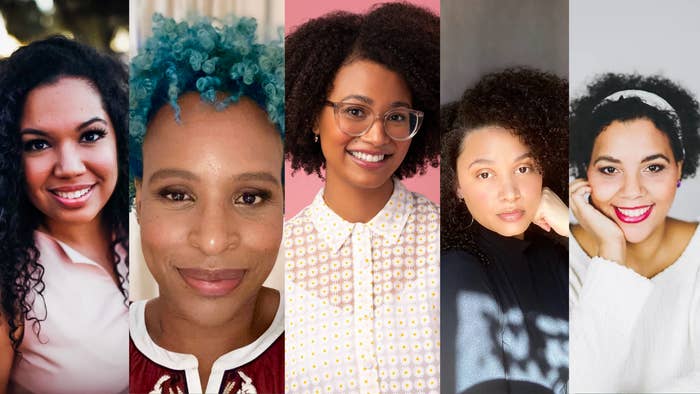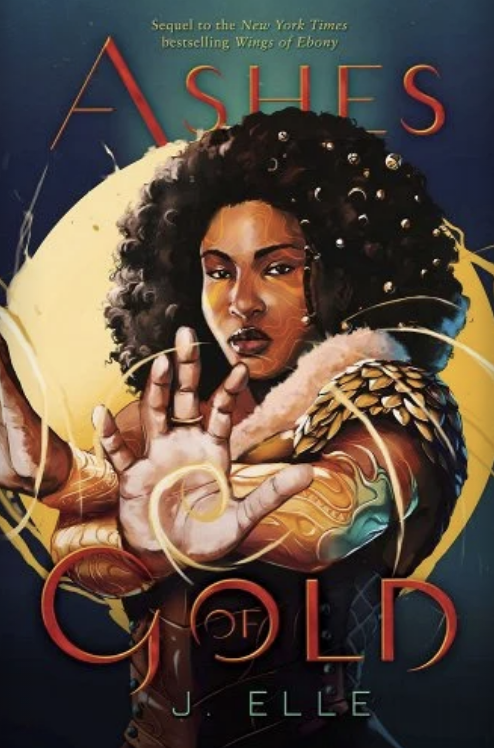Recently, I had the opportunity to chat with Nicola Yoon (Instructions for Dancing), J.Elle (Ashes of Gold), Alechia Dow (The Kindred), Elise Bryant (One True Loves), and Kalynn Bayron (This Wicked Fate) to discuss the importance of Black love and why it's vital to center it in their stories. Below you'll find their thoughts as they discuss why this particular topic should be celebrated widely.

How do you feel the YA genre has changed or shifted around stories centering Black trauma and joy? How has the last year shaped the genre moving forward?
Alechia Dow: YA publishing has very slowly, especially over the last few years, realized that Black teens deserve more than pain. They deserve stories where Black teens can have low-stakes romantic comedies, sci-fi fantasies, fast-paced thrillers, and everything in between. While there's absolutely a place in this age group to explore trauma — and a lot of those stories are powerful and necessary — I think publishing has seen that stories beyond that sell just as well. And are just as necessary.
Nicola Yoon: In YA, I've seen quite a few conversations around the need to have stories that center joy. So many times when we see media about Black characters, they are stories of pain and trauma. And while I firmly believe we need these stories, I also think we need joyful stories full of love and adventure and philosophy. We need to allow Black characters the full breadth of their humanity.

Kalynn Bayron: Black creators have always been eager to tell stories that encompass all the nuances of our existence. That sometimes includes examining pain and trauma. However, publishing has historically been laser focused on these types of stories because this is the lens through which white/cis/het audiences are most comfortable viewing us. There has always been a need to tell other kinds of stories, but very often those stories don’t get the support they need to be successful. More recently, I have seen a push to rally around stories that celebrate Black joy. I’m happy to see that. I want marginalized creators to be able to tell whatever kinds of stories move us — from romance to horror, from paranormal to thriller. I think when we talk about celebrating Black joy in storytelling, we need to expand that definition to cover the joy that so many of us feel when engaging in the kind of work that is most important to us.
J.Elle: I think we’re seeing a gradual shift in publishing to center stories that aren’t just about Black trauma. But to be clear, the stories about the realities our community faces in our fight against oppression are still important. It’s the lack of balance on bookshelves that is deeply concerning. So, often trauma-driven stories become the only ones receiving spotlight, hefty marketing budgets, big advances, space on bookshelves, which does a grave disservice to our community because it elevates one narrative — which can inadvertently reinforce the very oppressive stereotypes that have contributed to the prevalence of that trauma.
For those outside of our community to engage in a healthy, productive dissection of traumatic realities faced by many Black communities, they need to also read stories with narratives that highlight the joy and love of our experiences outside of trauma. To truly empathize with Black trauma, you have to be exposed to Black joy. You have to understand what is being taken.
The full breadth of our humanity deserves to be depicted on shelves, and I’m thrilled to see we’re getting to have more stories about that. I do believe the events of 2020 have helped spur this shift in publishing. Though I must note, it’s especially grieving that it took such inhumane disregard of our lives to bring about such change. Still, I am grateful for the conversations that are coming out of publishing around Black joy this last year.

Elise Bryant: I think there have been some powerful, important YA books published that shed light on systemic racism and police brutality, and we need these books. But we also need books that center our joy to balance these out and show our complete experiences as human beings. Racism impacted my daily life as a teen, yes, but there were also the moments trying to learn complicated dances with my friends and agonizing over if the boy I had a crush on even knew I existed. I want to see the whole Black experience represented in books.
There are a lot of books coming out that I’m so excited for — books centering Black girls and their love that I wished for and searched for as a teen. But I know this industry still has a long way to go. And I’m curious to see if all the promises from publishers lead to a lasting change and long careers for authors that have so many more stories to tell past the book deals that were made in 2020.
Why is it important for you to center love in your stories?

AD: Love is the bridge between me and readers. It's universal. It doesn't always have to be romantic; it can be platonic, best friends, family, community, yourself! It's relatable and adds layers to the story and the characters. When I write, love is centered because it's easy to root for, even when the story twists and turns dark, even when the characters feel low. Love is there; it's what keeps everyone going.
NY: Love, in all its forms, is the force that makes the world go around. I'm not just talking about romantic love. I mean love of your family, friends, work, and life. I think that love, and what people will do to get it and keep it, will always be interesting to me.
KB: Love is at the center of most stories. Whether it's fantasy, romance, or horror — love is usually the driving force. Love is what defines our humanity. My work centers the love between Black people, and not just the romantic kind of love. Love between friends, parents and children, caregivers and our elders — these kinds of love are equally important and are worthy of being centered, especially in children’s literature, where there is a severe lack of representation.

JE: I believe in the transformative power of love. Maya Angelou said, “I am grateful to have been loved, and to be loved now and to be able to love. Because love liberates.” Love is central to life, and thus love will always be central to my stories. In Ashes of Gold, my latest YA fantasy novel, Rue, the main character, is caught in a love triangle with two Black boys (something rarely seen in YA). Both relationships teach her something about herself and fundamentally change her in amazing ways. That is the power of love. She is also learning about her worthiness of love in this story because Black love isn’t just about romantic relationships. To me, it encompasses the freedom to engage in self-love boundlessly, to prioritize our mental health above our work, to place priority on our self-care. To love fully and completely, ourselves and others. That is freedom.
EB: I center love in my stories because those are the kinds of stories I’ve always loved to read. Growing up, I wanted to escape into fluffy, swoony stories and know for certain that there would be a happily-ever-after — but it was so hard to find books like this with a Black girl as the star. I’m honored that I get to write these books for readers now, thanks to the many Black women authors that paved the way. And especially right now, I think prioritizing our joy, rest, and love as Black people is one of the ultimate acts of resistance.
When you set out to write your books, what is your intention?
AD: My intention is to always give hope. There's enough negativity in our world right now; there's a lot going on and things feel bleak, right? I want to give readers an escape. I want to give them beauty and joy, love and hope, and a chance to see someone who looks like them being the love-interest protagonist having adventures in the universe.

NY: My intention is to answer a question, usually philosophical one, that's bothering me. I don't always have the answer to my question when I get to the end of a book, but I've at least explored all the questions I need to.
KB: My intention is first and foremost to tell an engaging story. I love storytelling, and I think the best thing I could ever hope to achieve as a writer is to write a story that readers stay up late into the night to finish. Every time I sit down in front of a blank page with an idea and some notes, my goal is just to tell the story to the best of my ability. Other hopes and goals develop along the way, but at the beginning, it’s just the need to tell a good story.
JE: I write stories to explore all of the nuances of humanity and reflect lived experiences to a people, my people, who have had too few.
EB: I think so often, Black girls are expected to be perfect. They have to be strong. They’re seen as adults when they’re still children figuring themselves out. In my books, I want to show Black girls being messy, making mistakes, learning and growing — and still be given grace and love through it all. I want Black girls to get their happy endings — not because they’ve earned it through their pain, but because they’re inherently deserving. I want Black girls to feel seen and feel safe when they read my stories.
If you'd like to learn more about these authors, be sure to check out their websites and books: Ashes of Gold by J.Elle, Instructions for Dancing by Nicola Yoon, The Kindred by Alechia Dow, One True Loves by Elise Bryant, and This Wicked Fate by Kalynn Bayron. For more discussion surrounding Black Love, join these authors in virtual conversation on Feb. 2.
Make sure you head here for more of our Black History Month coverage.


